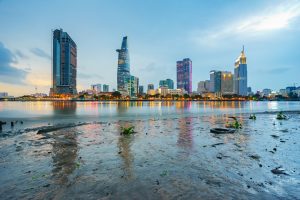The Communist Party of Vietnam (CPV) has issued a broad-ranging directive calling for further restrictions against the activities of civil society groups, including trade unions, and increasing scrutiny of foreign organizations and Vietnamese nationals traveling abroad.
The document, known as Directive 24, was obtained by Project88, a Bangkok-based human rights organization focused on Vietnam, which examined it in a report released on Friday. While the organization was unable independently to verify the authenticity of the directive, references to it in several CPV media outlets suggest that it is genuine.
Directive 24, which the Politburo reportedly issued in July, seeks to contain and manage the supposed threat posed to Vietnam’s national security and the country’s economic opening.
As it stated in Project88’s English translation, “The comprehensive and deep international integration and implementation of trade agreements has created new difficulties and challenges for national security.”
This has provided openings for “hostile and reactionary forces” to “increase their sabotage and internal political transformation activities… forming ‘civil society’ alliances and networks, ‘independent trade unions,’ creating the premise for the formation of domestic political opposition groups.”
As such, Directive 24 calls for increased vigilance of foreign investors to ensure they cannot “hide in the shadows” and take over “vital economic sectors.” It warns that for all of Vietnam’s apparent economic successes, “security in the economy, finance, currency, foreign investment, energy, labor is not firm, there is a latent risk of foreign dependence, manipulation, and seizures of certain ‘sensitive areas’.” It calls for increased scrutiny of people taking advantage of international commitments that Vietnam has made to mobilize and form opposition political organizations that implement “color revolutions” and “street revolutions.” With a similar goal, the directive also calls on the authorities to “closely manage officials, party members, and Vietnamese citizens that go abroad to do business, cooperate, engage in exchanges, visit, and travel.”
In Project88’s characterization, Directive 24 “frames all forms of international cooperation and commerce as threats to national security and articulates a disturbing plan to deal with these perceived threats.”
“The mask is off,” Ben Swanton, a co-director of Project88, said in a statement accompanying the report’s release. Vietnam’s leaders are saying that they intend to violate human rights as a matter of official policy. They are now directly implicated in abuses by the state and should be isolated, not embraced, by the international community.”
However, Directive 24 represents less a departure than a refinement and reinforcement of the CPV’s past practice. As Carl Thayer, an emeritus professor of politics at the University of New South Wales, told the BBC, the directive “does not signal a new wave of internal repression against civil society and pro-democracy activists so much as business as usual, that is, the continuing repression of these activists.”
Over the past decade, the country has seen a marked narrowing of the already scant space for independent political organizing and journalism. As Project88 has been diligent in documenting, the country’s security apparatus has since 2016 “imprisoned scores of human rights activists and dissenters, while shutting down the only independent journalists’ association, publishing house, and anti-corruption organization operating in the country.”
Over the past week alone, the authorities have arrested Nguyen Chi Tuyen, a prominent dissident YouTuber, and Nguyen Vu Binh, a journalist and critic, on top of the five environmental activists to be imprisoned on tax-related charges over the past two years.
What the directive does offer is clear and bracing evidence, if any was needed, that Vietnam’s increased economic openness to the world will not be matched by any degree of political liberalization. This also confirms suspicions that Hanoi has no interest in respecting, at least not in any more than cosmetic form, the human rights clauses contained in some of Vietnam’s recent trade deals, particularly the EU-Vietnam Free Trade Agreement signed in 2020.
Like the Chinese Communist Party in Beijing, the CPV is seeking the sweet spot of integration into the global economy while screening out any influences that could catalyze any sort of threat to its power. The difference for Vietnam, as Jonathan Head of the BBC noted, is one of scale: the country is not large enough to recreate China’s “great firewall” to control the internet; neither does it possess China’s massive domestic market, forcing it to rely on foreign investment to sustain its economic growth over the long term. Time will tell whether Hanoi can achieve what Deng Xiaoping once sought in the Chinese context: to open up the windows without letting in any “flies.” But given how Vietnam has been welcomed in the West in recent years, as both a strategic partner and a red-hot destination for foreign investment, suggests that its success is more likely than not.

































